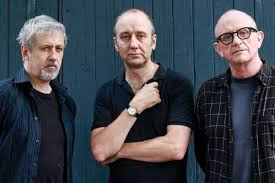As usual, there are plenty of lists with the best releases, re-releases, singles, videos and of all the things that people and music journalists enjoyed in 2019. In general, I noticed in myself a change in the type of music that I mostly attracted. This shift is mainly from the general abstract axis of ambient and electronic music, into more free and improvised jazz. It is a change that has started a couple of years ago, but in 2019 it became more prominent in the records that I bought.
However, there are two tracks that I liked the most in 2019. As a big fan of Tim Hecker for many years, I enjoyed his latest release, 'Anoyo' in Kranky. Hecker after a small break-in 4AD he returned to Kranky and before 'Anoyo' he released 'Konoyo' as a full album release. In previous posts, I've talked about how innovative Hecker is and how he kind of redefined the whole landscape of ambient music. And still, after so many years, he keeps on offering something different, new and good, and in relation to ambient music, it isn't always easy to differentiate from the limits of noise and silence.
In an interview that I read of Tim Hecker he refers that 'Konoyo' has a lot to do with the destruction and the end of the world. The cover of the album definitely offers these interpretations about the content of the album, in the limits of ambient and instrumental music. So, about 'Anoyo' my favorite track is called 'That World', and even the sticker of the vinyl has a picture of the globe that kind of prepares the listener about the content of the album. In this track Hecker uses Japanese instruments and sounds, as he did for 'Konoyo'. Also he uses different sound layers, but this time based more on the instruments. The sounds from the track are like music coming from the chaos and creates a contradiction between a dark sense and more melodic sounds from the instruments. This contradiction feels like a competition of this darkness of the world and its gradual destruction, to a more peaceful melody of the great place we live in. How these two things are combined? This is something that Tim Hecker can do, and as I usually say I don't know how he does it, but he is doing in a captivating way that can absorb the feelings of the listener.
On the other hand, Yves Tumor moved from Pan Records to the Wrap label. Firstly, to mention that the album 'Safe in the Hands of Love' was released in 2018, but I heard it in 2019, and this is why I'm writing this review. This blog is mainly dedicated to experimental forms of art with the main focus on experimental music. Yves Tumor, for some listeners it could be labelled as modern, contemporary, or even experimental, but is a bit far what we've tried to cover here, as it could be easily listened to a bar, or a club.
The track I loved most from this album is called 'Hope in Suffering (Escaping Oblivion & Overcoming Powerlessness)'. And is the winner for 2019 as the best track I listened to in 2019. I have been looking for words about how powerful, dark and dominating this track is. The vocals and lyrics from Oxhy, are so strong that you can't discern if it is like reading poetry, expressing anger, giving orders in an assertive manner, but mostly the feeling I get is about emergency, fear, and despair. Of course, the lyrics itself isn't enough. The track starts with a repetitive tune from a cello and continues like that for the rest of the track. But the most amazing part of this track is the contribution of Puce Mary. Her industrial, metallic, electronic sounds, seems like that it is coming out of the factory, or a futuristic scene from a movie. The way that Puce Mary composes this sound and her production, along with the voice of Oxhy, is so expressive and I felt that I've been trying to focus on the different sounds and how they are used together in the track. Moreover, from a sound experience point of view and living in a city like London, I felt that using the underground every day is the perfect companion to the images and sounds I sense every day. That was the soundtrack of my everyday life and Yves Tumor definitely deserves it.













